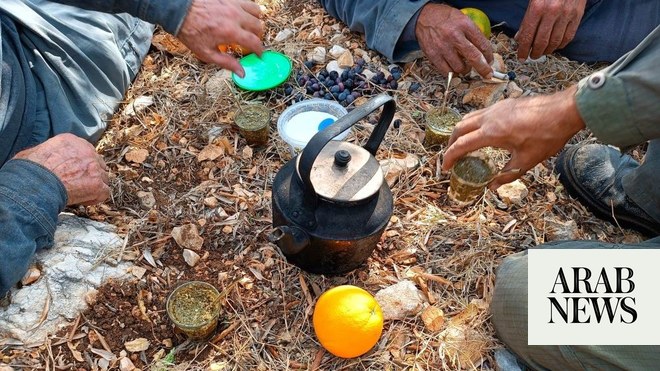
Herbal tea popular in South America has large market in Levant, particularly Syria
‘We consider that consumption will keep growing in the Middle East,’ mate company owner tells Arab News
SAO PAULO: During last year’s World Cup in Qatar, football fans worldwide could see the Argentinian squad drinking yerba mate, a herbal tea omnipresent in Argentina, Uruguay, Paraguay and southern Brazil.
While consumption outside South America is restricted to a handful of European countries and parts of the US, the product has a large market in the Middle East, particularly in Syria and to a lesser extent Lebanon, Palestine and Jordan.
In 2022, Argentina exported 40,000 tons of mate, and Syria alone bought 30,000 tons worth $91 million. In parts of the Syrian coast, drinking mate is almost as common as it is in South America.
It all began after hundreds of thousands of people left Syria and Lebanon and moved to Argentina and Brazil at the end of the 19th century and the first decades of the 20th century. Some of them later returned to their homeland and took mate with them.
“I started drinking mate at an early age, given that I grew up in a family and society in which it’s a very popular habit,” Anas Mahmoud, a 34-year-old lawyer from the Syrian city of Tartus, told Arab News.
His great-grandfather moved to Argentina with his cousins and returned to Tartus after 10 years. While that is the family history of many in the region, even Syrians with no contact with South America assimilated the mate habit, Mahmoud said.
“I drink it three times a day, in general with some herbs like rosemary or laurel, or adding ginger and lemon. You can find mate in every grocery store,” he added.
During the olive harvest season in rural areas of Tartus and Latakia, farmworkers usually drink it during their break, he said.
Mate’s consumption was probably popularized during colonial times in South America due to its stimulating properties as it is rich in caffeine.
Guarani indigenous peoples were the first to drink it, and it was rapidly disseminated by Jesuit priests in their missions during the 17th century.
Not coincidentally, mate consumption took root in the Argentinian province of Misiones and in neighboring regions of Brazil, Paraguay and Uruguay.
With growing consumption in the Middle East, Syrian businessmen got involved in the Argentinian industry years ago.
That was the case for Omar Kassab, who arrived in Misiones almost 20 years ago and owns a mate company in the city of Comandante Andresito.
“The idea was to directly meet the growing demand for mate in Syria. We consider that consumption will keep growing over time in the Middle East,” he told Arab News, adding that the huge flux of immigrants and refugees generated by the war in Syria led many of his countrymen to move to neighboring Arab nations, which are now also importing mate.
“They’re living in the Gulf, in Turkiye, in Egypt, and they want mate. Over the years, the habit may be absorbed by non-Syrian people in those countries,” Kassab said.
With government support, Argentinian mate exporters have been heavily investing in making the product known to Arabs.
In February, several mate producers took part in Gulfood, the world’s largest food exhibition, in Dubai.
“We could see how positive the impact of Argentina’s victory in the World Cup was for yerba mate,” Maria Marta Oria, who works at the promotion and development department of Argentina’s National Yerba Mate Institute in Misiones, told Arab News.
“(Lionel) Messi is the most important face of mate as a person, as a football player and as a consumer.”
Indeed, Argentinians have been making good use of their football team’s popularity to expand the mate international market.
Bangladesh, for instance, where thousands of people rooted for Argentina during the World Cup, recently received a delegation of the mate industry.
Sotirios Ghinis, an economist at the Arab-Brazilian Chamber of Commerce, said mate can be used in several segments, from bottled beverages to cosmetics.
He added that many consumers in Arab nations have been looking for healthy, natural products, and mate can certainly be an option given that it has many benefits, including antioxidizing and diuretic effects.
“Mate production in Brazil is ecologically sustainable, so most companies can obtain a halal certification without many difficulties,” Ghinis told Arab News, adding that the first step for companies that want to reach Arab nations is to establish direct contacts with potential clients.
“They need to go there and talk face to face with Arab companies. Internet ads aren’t enough,” he said.
Regina Koppe, who is in charge of exports at Lago Verde, a mate producer in the Brazilian state of Rio Grande do Sul, said the company is planning to sell to Arab countries.
“We’re considering visiting international trade fairs in order to meet Arab importers. Brazilian mate companies should associate and invest in publicity abroad,” she told Arab News.












